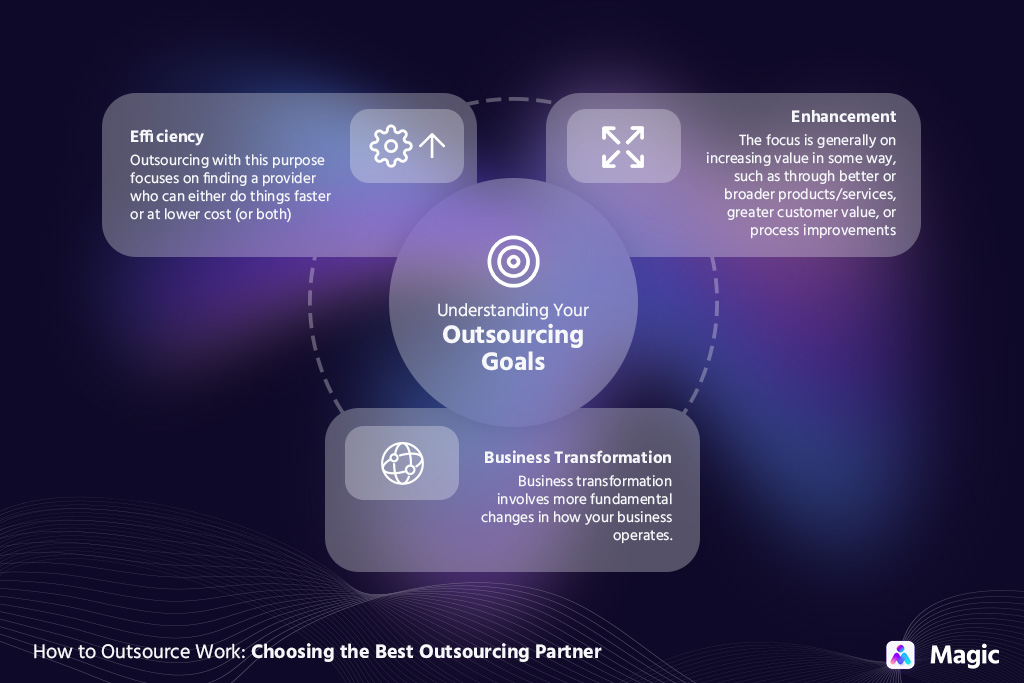According to recent research, global spending on outsourcing could reach $731 billion this year. In addition to traditional outsourcing companies, businesses around the world also rely on shared services, on-demand work markets, and global internal teams. And outsourcing isn’t just for cutting costs. Improved business strategies, access to talent, and keeping up with digital transformation are also popular outsourcing motives.
With all its benefits, outsourcing may seem like an obvious decision. And true, outsourcing is poised to become ‘just the way things are done,’ if it isn’t already. But that doesn’t mean you can enter into it without considering your options. Before starting, it’s essential to think about how to outsource work and what outsourcing company to use.
In this post, we provide an overview of evaluating a potential outsourcing partner, including choosing an outsourcing setup, the basic legal considerations, and evaluating a possible service provider.
- There’s more than one way to outsource. In addition to outsourcing to an agency, you can outsource to remote freelance teams. Choosing the right setup can narrow down your search.
- Outsourcing isn’t just about service providers. You need to understand your own company’s goals and capabilities. Outsourcing can be an effective strategic move, but it isn’t a shortcut.
- Take care with legal considerations. Scrutinize contracts and ensure service providers are compliant with relevant laws related to taxes, infosec, and data privacy.
- Make sure your service provider is someone you can work well with. Cultivating a good working relationship is crucial to long-term success.
Different Types of Outsourcing Models
There’s more than one way to outsource work. Most people think only about traditional outsourcing, but alternative setups such as shared or managed services and dedicated remote teams are also now widely used.
Deciding on an outsourcing model is a good starting point, since this will determine which outsourcing firms you should consider. Furthermore, the decision is based on your objectives, priorities and budget constraints. Knowing this information will help you determine what you want to get out of an outsourcing company.
Traditional Outsourcing
Traditional outsourcing is what most people think of when they hear the term outsourcing. It’s low-cost, no-fuss with contracts signed on the basis of hours worked. The work assigned is usually routine or repetitive, with an emphasis on (cost-)efficiency. This includes information technology (IT), human resources (HR), and accounting or bookkeeping. It also covers the eponymous ‘business processes’ of business process outsourcing (BPO), such as call center work and customer service.
Traditional outsourcing is a good choice if your main priority is keeping costs low and the work involved requires minimal management or oversight.
Managed/Shared Services
Managed or shared services are more widely used for tasks that require more involvement. In addition to cost reduction, these services offer added value, such as distinct expertise or technology, or even improved infrastructure. Managed services are widely used for cybersecurity and keeping pace with other technological developments. Contracts are usually based on expected outcomes, which are codified in service level agreements (SLAs).
Businesses that outsource often choose managed services if they need additional expertise or resources, such as technology and infrastructure, databases, redundancy systems, or specialized equipment.
Global/Remote Teams
A growing trend in the realm of outsourcing is assembling dedicated teams offshore. These teams may function, in effect, as an in-house unit, but are contracted through an intermediary, such as an on-demand work platform or through companies who hire remote workers. Assembling such a team can take a lot of time and effort at the onset, but offers greater flexibility in the long run.
Having a remote team is a solid choice if you want to access top-tier talent, regardless of where you’re located. It’s also cost-effective and provides greater flexibility.
Understanding Your Outsourcing Goals
As mentioned earlier, part of choosing an outsourcing company depends on what your main objectives are. At the ‘big picture’ level, you might pursue these three broad objectives:
Efficiency
As a business owner, you want your company to run as efficiently as possible. If efficiency is your main priority, find an outsourcing provider who can either do things faster or at a lower cost (or both).
Reducing costs is an attainable goal since offshore employees in outsourcing hub nations tend to have rates as low as 30% of their North American equivalents.
Any of the three outsourcing models above can support efficiency, though most business owners choose traditional outsourcing when their goal is to reduce costs.
Enhancement
In addition to greater efficiency, many business owners outsource to enhance their current offerings. The focus is generally on increasing value in some way, such as through better or broader products/services, greater customer value, or process improvements.
Traditional outsourcing services can save time for your in-house team, allowing them to focus on high-value activities. Managed services are also a reliable choice if your goal is enhancing your current offerings.
Business Transformation
Business transformation involves more fundamental changes to how your business operates and hinges on people, technology, and processes. The specifics will vary depending on what sort of changes you’re planning to make.
Business transformation is one of the most common goals businesses have for choosing a managed service model. You can also use a remote team to gain the necessary skills or talent to make transformative changes.
Basic Legal Considerations of Outsourcing
A thorough contract is the backbone of a good outsourcing agreement. In addition to providing a basis for legal recourse in the case that something happens, a good contract provides common ground and aligns expectations.
We’ve listed a few things you should keep in mind when drafting a contract or reviewing an outsource company’s terms.
Output and Indicators
The first thing to check is whether a firm can deliver the outsourced services you need when you need them. In order to assess this, you’ll need well-defined key performance indicators (KPIs) and a service level agreement (SLA). An SLA can be included in the contract itself or may be a separate document.
Make sure your contract includes objective measurements. This could include the time spent on work (including defining what counts as work time) or quantifiable assessments of output.
When assessing this part of a contract, consider:
- Whether the KPIs are relevant to the results you want
- Whether the KPIs or SLAs are well and clearly defined
- How often you will conduct assessments
- Margins and consequences of failure
Intellectual Property
Intellectual property (IP) can have huge implications in an outsourcing agreement. Instances, where it may become an issue, include software development or content creation and distribution—among other things.
Two things to pay special attention to are ownership and usage (which will likely be governed by license agreements). If you’re getting an IT or infosec process outsourcing firm to develop a solution for you, for example, they may retain rights while granting you a license for use or distribution. Consider:
- What is allowed under the license?
- What IP modifications are permitted?
- What limitations restrain how you can use the IP (purposes, time, region, etc.)?
Information Security and Confidentiality
Information security is a major concern these days. Data’s value has increased, cybercrime has become more sophisticated, and keeping ourselves safe online is more important than ever.
Infosec laws have become strict to keep up, but they don’t always apply uniformly across different regions. It’s important to review a potential provider’s infosec compliance, especially if they operate in another country.
Here are some questions to ask your outsourcing company to ensure they keep their data safe:
- What steps do you take to protect my data?
- What restrictions apply? Are you in compliance?
- What contingency measures or failsafes do you have in place?
- Have you been accredited by a third party? (e.g. ISO, NIST)
If you work in a region with stringent data privacy requirements, such as the EU—specifically its GDPR—you should also make sure service providers are in compliance with those laws.
Non-Compete Agreements
If you rely on outsourcing functions that are provided, in turn, to your clients then it’s important that your contract include non-compete agreements and similar clauses to keep them from entering into transactions that could compromise you, including taking clients from you by working directly with them.
Tax Compliance
Make sure that you and your service provider are in compliance with any tax regulations that apply. If you’re offshoring, be sure to check what tax agreements, if any, exist between your country and your outsourcing company’s country. Always consult with your tax professional or CPA before working with an international team.
Evaluating an Outsourcing Partner
After refining your search based on your objectives, constraints, and preferred outsourcing model, you can begin comparing providers. Here are some aspects to consider.
Expertise and Experience
When choosing an outsourcing company, always look at its track record. In highly technical fields, this can be straightforward: check for licenses, certifications, or the tools and methods they use. In other cases, though, you may have only loose criteria to judge by. Here are some questions to ask about their experience:
- How long has the business been operating?
- Who are their leaders? What are their backgrounds?
- What do past clients say? Are these clients in your field (or an adjacent one)?
It can also be helpful to check the broader context of business outsourcing in that provider’s country. In some countries, the BPO industry enjoys government incentives or support from private groups. This creates a more stable environment, which can lead to a better overall experience. Magic, for example, benefits from fiscal and tax incentives in the Philippines, which are conducive to providing high-quality, cost-effective services.
Cultural Fit
Outsourcing often includes working with people from different cultures, so creating a cultural fit is important. Culture can include practices, routines, and common values. What sort of work ethic do they have? What kind of environment do they cultivate? How do they treat deadlines, processes, and agreements?
This can be difficult to assess at a glance, but here are some ways to start.
- Communication habits: See if they’re clear, courteous, and respond promptly.
- Onboarding: Do they have a process, and can they explain it?
- Employee Reviews/Turnover: Are they running a ship people want to work on?
Scalability
The last thing to consider is the outsourcing company’s ability to scale. Think about where you see your business in the next few years. If you want to scale your operations and grow the business, you’ll want to work with an outsourcing company that can scale with you.
Find the Right Outsourcing Solution With Magic
Finding the right outsourcing company can be difficult. You need to do some research to find the information you need. Knowing your budget and goals will help you find the right outsourcing company so you can grow your business and service offerings.
Get dedicated outsourcing services across virtual assistance, sales, accounting, customer support, and AI services. Magic can help you hire a skilled remote worker or build an entire team with no contracts! Pay as you go and scale to your needs. Book a call now to learn more about it.










